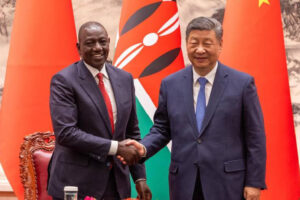
James Emejo writes that federal government must sustain the current growth momentum in the non-oil sector which has contributed to stabilising the macroeconomy in recent times
Non-oil exports, comprising goods and services that sold to other nations excluding crude oil and its derivatives, remain a key economic buffer for the country, providing for a more resilient, inclusive, and sustainable economy.
Amid current efforts to diversify the base of the Nigerian economy, investments in infrastructure, policy reforms, and market access for non-oil products have become essential.
If anything, non-oil exports are crucial for shielding the economy from global oil price shocks, and guarantee foreign exchange stability with the attendant impact on the overall economy.
No doubt, recent milestones in the non-export sector, particularly export promotion activities, have helped to provide the much-needed liquidity in the economy, thereby aiding recovery from a hitherto precarious economic situation.
The federal government has intensified efforts to diversify the economy — a strategy aimed at expanding the productive base of the economy to reduce its over-dependence on crude oil revenues – an initiative which has produced salutary results in recent times.
In the time past, the country’s non-oil exports were nothing to write home about, leading to a weaker Naira because imports continually overwhelmed exports while the country remained a mono-economy, mainly relying on oil exports, and remained exposed to volatility in the international oil market.
However, all these appeared to be changing for better, as evidenced in the country’s non-oil products export performance in the first half of the year (H1 2025) which rose by 19.59 per cent to $3.23 billion, compared to $2.70 billion in H1 2024.
The Nigerian Export Promotion Council (NEPC) under its current Executive Director/Chief Executive, Nonye Ayeni, has continued to spearhead remarkable initiatives to further unlock FX to the economy to strengthen the local currency among others.
In H1, the volume of exports increased to 4.04 million metric tonnes (MMT) compared to the 3.83 MMT for the same period of 2024.
Nigeria exported product worth 662,993.00 metric tonnes to 11 ECOWAS countries amounting to $139.242 million -an increase in exported products as against the same period in 2024.
In the same vein, the country exported 488,499.44 metric tonnes of products worth $83.538 million to 21 other African countries which amounts to 2.59 per cent of the total export value as compared to 1.96 per cent for the same period of 2024.
Essentially, the half-year progress report on the non-oil export performance, further reaffirmed the commitment of the federal government through the NEPC to rescue the economy from the dangers of over reliance on oil revenues.
Ayeni, while celebrating the successes, stated that the council was conscious of ongoing challenges in the sector, and reaffirmed its commitment to navigate existing challenges to deliver value to stakeholders.
She said: “At NEPC, we remain resolute and committed to driving up the volume and value of non-oil exports for sustainable and inclusive economic growth” adding that the country was expanding access to global markets to ameliorate the possible impact of the recent hike in trade tariffs imposed on Nigeria by the United States(US).
She attributed the boost in non-oil exports to the significant increase in global demand for Nigerian products, including the African region, adding that this increased the value of key Nigerian commodities and products, such as cocoa, sesame, cashew and aluminum.
She said the AfCFTA provided wider market access and tariff relief for Nigerian exporters, adding that the council led export intervention programmes such as capacity building on quality and standards, packaging and labelling, export documentation and certifications.
The NEPC boss further pointed out that during the period under review, the council facilitated market access and market linkages progammes for exporting companies, thereby giving their products more visibility in the global market.
According to data from Pre-shipment Inspection Agents (PIAs), of the top-20 products exported in the first half of 2025, Cocoa Bean was the most exported commodity with 34.88 per cent value in terms of total export compared to 23.18 per cent for same period in 2024.
Urea/fertilizer, came second with 17.65 per cent as against 13.78 per cent for the first half of 2024 while cashew nuts, with12.35 per cent of the total exported products as against 8.62 per cent for the same period in 2024 was third on the log respectively.”
Ayeni noted that, “The growth in value-added exports improved earnings, as more exporters are now imbibing the culture of value addition to their products.
“The rising demand from emerging economies, such as India, Brazil, Vietnam and Africa increased Nigeria’s non-oil export volumes and diversity.”
Landmark initiatives
The NEPC has continued to play a crucial part in the non-oil sector through several laudable programmes.
In 2024, the council launched a transformative sensitisation programme targeting Informal Cross Border Trade (ICBT) which led to the signing of an MoU with the National Bureau of Statistics (NBS) to facilitate data collection at Nigeria’s border communities.
Ayeni said the council is also working with players along these borders to further mainstream the activities of informal traders by providing seamless trade facilitation in terms of export documentation and procedures among others.
The council also launched the market access and market linkage programmes to create market access and linkage for export of Made-in-Nigerian products, thereby exposing exporting companies to B2B engagements while creating visibility for Nigerian products and services in the international market and across the African region.
Also, to facilitate the ease of doing business and seamless documentation processes, the council, during the first half of the year, registered a total of 2,285 new exporters, including 377 female and 1467 male exporters captured on its portal respectively.
According to Ayeni, the council trained over 100 women-led businesses on how to increase the volume and value of spice and herb exports through aggregation centers as part of concerted effort to streamline the supply chain and serve as a hub for connecting producers to local and international markets, in alignment with the Renewed Hope agenda of President Bola Tinubu, to mainstream women and youth in the export eco-system.
According to her, a total of 236 different products were exported in the period under review, representing an increase of 16.83 per cent compared to the 202 distinct products exported in the first half of 2024.
The products exported ranged from agricultural commodities, extractive industries, and manufactured and semi-processed ones.
She said: “However, it is pertinent to state here that the non-oil export of Nigerian products is gradually diversifying from traditional agriculture exports to semi-processed/manufactured products.
She said: “In the first half of 2025 as Sesame seed came fourth accounting for 4.23 per cent Cocoa and its derivatives topped Nigeria’s non-oil exports in the first half of 2025, accounting for 41.11 per cent of total export value due largely to rising global demand, higher prices, and increased local processing capacity.
“Thus, the export of value-added products such as cocoa butter, liquor, and cake reflects Nigeria’s progress in exporting value-added products.
“This growth is driven by improved product quality, investment in agro-processing, and access to premium markets like the Netherlands and Germany.
“More importantly, government-backed trade facilitation and compliance with international standards have further enhanced competitiveness and increased export earnings.”
Demand for Nigerian products
According to the NEPC non-oil performance report, non-oil receipts were largely attributed to significant increase in global demand for Nigerian products across the globe including the African region.
Ayeni said this increased the value of key Nigerian commodities including cocoa, sesame, cashew and aluminum while AfCFTA provided wider market access and tariff relief for Nigerian exporters.
In addition, NEPC spearheaded export intervention programmes such as capacity building on quality and standards, packaging and labelling, export documentation and certifications.
She noted that market access and market linkages progammes for Nigerian exporting companies gave their products more visibility in the global market while growth in value-added exports improved earnings, as more exporters are now imbibing the culture of value addition to their products.
The rising demand from emerging economies, including India, Brazil, Vietnam and Africa also increased the country’s non-oil export volumes and diversity.
Furthermore, in its determination to enable MSME exporters comply with global market requirements for export of quality products, the council had implemented international certifications covering FDA and HACCP for 200 exporters free and fully paid for by NEPC.
The objectives are to enhance compliance with global food safety standards, improve export readiness and reduce product rejections in international markets as well as build their capacity on GMP and food safety management systems.
Ayeni said the gesture greatly impacted SME exporting companies who now export quality products to niche markets thereby increasing market access and competitiveness of Nigerian products in the global market.
Among other things, a total of 23, 239 hybrid seedlings as well as other farm puts were distributed to 3, 047 farmers across the country as part of the NEPC Corporate Social Investment.
The intervention programme, which included cocoa, sesame seed and oil palm, significantly enhanced the quality of produce by the farmers as well as increased the production of these commodities for export in the global market.
CHALLENGES
Despite recent milestones, the country’s non-oil export sector is constrained by infrastructure and supply chain fragility, financial limitations, regulatory hurdles, and governance inefficiencies.
The country’s export competitiveness is currently bedeviled by high logistics costs, subpar port services, congested facilities, poor roads, and unreliable power supply.
The inherent challenge where exporters often reroute goods through neighboring countries to avoid delays, adding 20–30 per cent in extra costs are major disincentives to progress.
Export costs are notably higher in Nigeria where shipping a container out could cost about $1,500, compared to about $600 in Ghana.
In addition, several businesses struggle to meet international demand due to inconsistent supply chains and variable product quality, leading to rejected exports – a key concern which is currently being addressed by NEPC in collaboration with other regulatory agencies.
In addition, the agri-value chain remains fragmented with limited processing capacity, meaning exports are often raw, reducing value addition and competitiveness among others.
Moreover, financing and FX constraints remain key limitations for non-oil exporters, particularly small businesses which face high interest rates, lack of collateral, and complex loan procedures .
Also, the current FX regime further ensured that exporters often earn less due to unfavorable official rates versus parallel market rates.
However, the relative stability in the FX market coupled with some degree of predictability engendered by the Central Bank of Nigeria (CBN) is already addressing concerns of exporters.
Moreover, complex customs procedures, export documentation requirements, and bureaucracy in policymaking create barriers for exporters.
While there are schemes like Export Expansion Grants (EEG), implementation had been poor—only a fraction of promised funds was disbursed, and the process remains slow and ineffective.
According to analysts, export incentives remain weak compared to other countries such as China which provides up to 17 per cent export rebates.
Stakeholders believed that sustaining the current increases in non-oil receipts would require that these limitations be addressed by the government to further strengthen economic resilience and job creation.





